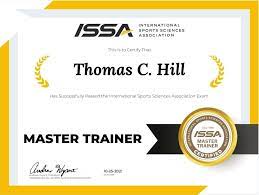
Individuals looking to become a personal trainer in New York will be shocked to discover the high cost of living. New York's average costs of food, transport, health care, rent, utilities and other miscellaneous items is over 90%. Personal trainer salaries in New York are likely to be higher than the average salary for other states.
YMCA personal trainer salary
The YMCA doesn't pay a minimum salary for non-training hours. But its trainers get paid $15 to $28 an hour. YMCA trainers fall into four tiers based on the number of sessions they teach per week. A Tier 4 trainer oversees a team consisting of three to five lower-tier instructors. The trainer earns $15 to $28 per hour. YMCA gyms will also pay for the trainer's CEUs and recertification fee.
The YMCA has a wide range of job opportunities. The YMCA personal training staff work with a wide range of clients and share the goal to create a welcoming environment. They educate clients and enforce policies regarding the safe use of exercise equipment. They are well-educated professionals who are able to help people of all ages and backgrounds achieve a healthy lifestyle. The salary for YMCA personal trainers is based on the 26 data points compiled by Glassdoor from both ymca employees and ymca users.

Personal trainers for 24-hour Fitness
The NYC average 24-Hour Fitness personal train salary is just under $55,000 per year. This job requires a high school diploma and certification in CPR and using an AED, as well as certification in the discipline of exercise fitness. You may be interested in earning more by earning your associate's, bachelor's, or master's degree in either kinesiology and exercise fitness. This will give you the skills to work at a 24 hour fitness. An MBA will allow you to be qualified for management positions. A degree is not enough. You may also want to earn a college CPR/AED certification.
Remember that higher-paying jobs are not easy to find when you apply for this job. There are many advantages to a career as personal trainer. These include building lasting relationships with customers and colleagues. For example, working at a 24-Hour Fitness may allow you to develop relationships with your coworkers, customers, and even competitors.
Planet Fitness personal training salary
Planet Fitness personal trainer salaries range from $25,000 to $42,000. The highest earners make between $59,000- $69,000 annually. The average salary ranges from $25,000- $42,000. However it could be higher or less depending on where you live or your skills. There are many opportunities for advancement in the economy. Learn more about the average salary of Planet Fitness trainers in New York. Read on to learn more about the career and salary requirements for Planet Fitness trainers.
The minimum wage is close to what the starting salaries are. Personal trainers often start their careers working in commercial fitness centers, earning around minimum wage. At first, they must recruit clients and get assigned to gym members. If the client is happy with their services, they might be able earn up to 30% of the facility fee. Personal trainer salaries are subject to fluctuation as the fitness industry grows. They often fall between 15 and 20 percent.

Ojai Valley Athletic Club personal training salary
Ojai Valley Athletic Club has the highest pay for personal trainers. They pay $125,000 per employee, or $60 per hour. This is 112% above the national average. It also boasts one of the highest employee retention rates with over 4,000 hours per annum. CareerBliss offers salary data for personal trainers. You can search for potential employers and compare their salaries.
An average $114,870 per annum is paid by the YMCA retirement plan to its employees. Ojai Valley Athletic Club employees average $125,000 per annum, which ranges from $101,576 to $153,285 annually. The organization offers members a 15% discount, which is a great perk. Ojai Valley Athletic Club personal instructors are highly-educated and available to help working professionals, seniors, and moms.
FAQ
What Does Exercise Do for Your Body?
Exercise can help you lose weight. Build muscle mass, increase energy, reduce stress, and improve quality of your sleep. Exercise is good for your mood, self-esteem, productivity, and heart health.
Why is it important for you to get enough rest?
Sleep is essential for maintaining a healthy lifestyle. Sleep is essential for your body to recover from daily stressors and repair itself. A good night's sleep is essential for optimal functioning throughout the day.
What is the importance of good nutrition?
We need to eat well for our health and wellbeing. A healthy diet should include fruits, vegetables and whole grains as well as lean proteins, dairy products, and legumes. A healthy diet will help you stay active and fit, which in turn leads to better overall health.
Can I eat while I exercise?
Yes. Yes. Make sure you choose low-calorie snacks such as watermelon, carrots, celery, apples, bananas, and grapes. These foods have nutrients that can help you perform better in your workouts.
Is it safe for me to exercise in cold temperatures?
Exercise outside whenever possible. However, the temperature of the air is not the only thing that can determine whether you are safe to exercise outdoors. Other factors include visibility, humidity, precipitation and wind speed. Layers of clothing should be worn if you are exercising outside in inclement temperatures.
What does caffeine do to my sleep?
Caffeine affects how long it takes you to fall asleep and how soundly you sleep. Caffeine makes falling asleep easy by causing drowsiness. However, caffeine can keep you awake longer and make it more difficult to fall asleep. Try drinking energy drinks and coffee before bed.
Should I drink alcohol when I work out?
You shouldn't consume alcohol while working out because it has calories. It is possible to increase your endurance by drinking moderate amounts of alcohol (one glass per day). It may also be beneficial in reducing fatigue and muscle aches that can result from vigorous exercise.
Statistics
- In high-income countries, 26% of men and 35% of women were insufficiently physically active, as compared to 12% of men and 24% of women in low-income countries. (who.int)
- Globally, 81% of adolescents aged 11-17 years were insufficiently physically active in 2016. (who.int)
- An estimated 110,000 deaths per year could be prevented (cdc.gov)
- Globally, 28% of adults aged 18 and over were not active enough in 2016 (men 23% and women 32%). (who.int)
External Links
How To
How to Lose Belly Fats More Fast
When we are trying to lose weight, belly fat is often seen as a problem. If you look at it, belly fat is actually a positive thing. It's the amount of fat stored around your stomach that protects your organs from getting damaged. Let's find out how to lose belly fat quickly.
Lack of exercise and stress are the main reasons we store body fat. Because of its stimulation of the production hormone cortisol, stress can make us feel hungry continuously. Cortisol can increase insulin levels in the blood. Insulin then stores excess calories as fat. An increased appetite can be caused by a lack of sleep. These extra calories can also be reduced by exercise
There are many methods to lose belly fat. Any one of these can be tried, depending on how much you have to spend. Here are some quick tips to get rid of belly weight.
-
Eat less food. You should eat smaller meals throughout the day than you would if you ate three big meals. This will help you consume less calories.
-
Drink plenty of water. Water flushes out toxins from your body and keeps you hydrated. Drinking water before meals will help you feel fuller for longer, so you don't overeat.
-
Avoid unhealthy snacks. If you're looking for quick fixes, snack foods like chips, cookies, candies, etc. might seem tempting. These fattening treats are best avoided as they have too many empty calories and sugar. Choose healthier alternatives such as whole grains, vegetables, fruits, seeds, nuts and seeds.
-
Do strength training exercises at least three times per week. Strength training helps build muscle mass, which means that you can burn more calories even when you are resting. It also strengthens bones, muscles, ligaments, tendons, the heart, lungs, and joints.
-
Regularly walk or stretch. Stretching is a great way to increase flexibility and mobility. This helps reduce back pain. Walking is a great way of burning calories, especially when you do it for just 30 minutes.
-
Reduce alcohol intake. Alcohol adds empty calories to your diet and has no nutritional value whatsoever.
-
Slowly lose weight. First, determine your current weight. Calculate your ideal weight by adding approximately 5% to 10% of the total weight. Once you have calculated your target weight, start reducing calorie consumption by 500-1000 calories daily until you reach your goal.
-
Avoid processed foods. These foods contain high levels of sugar, salt, and preservatives. Although they are convenient, processed foods don't have enough nutrients to sustain your health.
-
Don't skip breakfast! A good breakfast can improve concentration, memory, as well as energy level. Include protein (like eggs) and fiber, like oats, in your breakfast.
-
Have regular bowel movements. Constipation and irregularity can cause gas and bloating. This can be prevented by drinking plenty of water and increasing fiber intake.